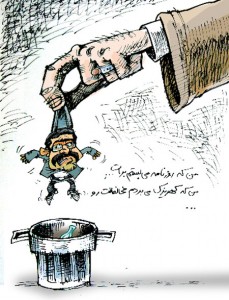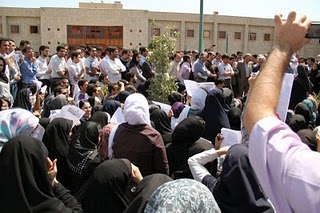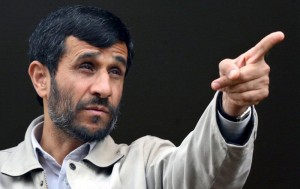The Latest from Iran (24 August): Keeping the News Alive
 Tuesday, August 24, 2010 at 10:57
Tuesday, August 24, 2010 at 10:57  2030 GMT: Sanctions Watch. A high-level South Korean delegation is in Washington to discuss sanctions against Iran.
2030 GMT: Sanctions Watch. A high-level South Korean delegation is in Washington to discuss sanctions against Iran.2025 GMT: Bad Dog. The Ministry of Culture and Islamic Guidance has banned Iranian media from publishing any advertisements about pets or pet-related products. The order was issued after a fatwa from Grand Ayatollah Nasser Makarem Shirazi.
NEW Iran: Is President’s Chief of Staff Rahim-Mashai Taking On Foreign Policy?
NEW Iran, Political Prisoners, & New Media: Discovering The Case of Zahra Bahrami
NEW Iran Feature: Why "Normal" is Not Bad (Pedestrian)
Iran Document: Interview with Detained Filmmaker Mohammad Nourizad
Iran Special: Have Ahmadinejad and Ali Larijani Kissed and Made Up?
The Latest from Iran (23 August): Political Cease-fire?
2015 GMT: Political Prisoner Watch. Reporter Ohne Grenzen has launched a German-language petition for the freeing of human rights activist and journalist Shiva Nazar Ahari, detained since July 2009 and facing a charge of "mohareb" (war against God).
2000 GMT: We've posted an evening feature, mulling over the possibility that the President's office, including controversial Chief of Staff Esfandiar Rahim-Mashai, is trying to take over Iran's foreign policy.
1630 GMT: Karroubi Watch. Kalemeh has picked up the Sunday statement of Mehdi Karroubi, made as he visited released detainee Mohammad Reza Jalaeipour (see 0715 GMT). Their take-away line is Karroubi's challenge to the regime to release political prisoners for Ramadan.
Saham News has also posted a Karroubi statement on women's rights.
1620 GMT: Truce Over (cont. --- see 0955 GMT)? So much for smooth sailing for the Government after last week's Supreme Leader intervention....
An impeachment bid has been lodged against Minister of Agriculture Sadegh Khalilian for excessive import of agricultural products, incompetence, and disregard for the insurance fund of agricultural crops. About 25 MPs have signed a letter to impeach Minister of Energy Majid Namjoo, on grounds of failure to implement plans and appointment of inexperienced personnel, and MP Mousa al-Reza Servati said some legislators are seeking to impeach Minister of Interior Mostafa Mohammad Najjar.
1420 GMT: Mousavi Watch. In his latest statement, made to children of veterans of the Iran-Iraq War, has declared that "the Green Movement has laid the foundation of achieving national reconciliation": “The continuation of the Green Human Chain that was formed [during the Presidential campaign] from Tajrish Square (in north of Tehran) to Rah-Ahan square (in south of Tehran) is being pursued on the national stage and all of us, despite our polarity of votes, different ideas, cultures and ethnicity, will gradually overcome our stammers and will be able to talk to each other more easily.” He added:
The political organizations that had been separated due to wring policies, are gradually coming closer together, talking to each other and sitting at one table. What that is their point of connection is the effort for achieving freedom, justice and understanding to guard people’s rights. The borders of “insiders” and “outsiders” are gradually fading and instead compromise and dialogue are becoming dominant. Today, more than ever, the blessings of the Green Movement of the people have laid the foundation of national reconciliation, friendship and unity among the various cultures, ethnicities, Shia and Sunni and all the layers [of the society].
Mousavi warned, however, "Some who see their interests in creating division and shattering people’s unity are continuing to spread hatred through fabricating false charges and other extensive measures in the name of fighting soft war'....They want to infect the cyber-space that emerged from the Green Movement with their viruses just as they turned the national media to a divisive and biased media with their meddling, so that our Muslim nation loses its trust in this beautiful window that has been opened."
1400 GMT: Reaching Out to the Opposition? Muhammad Sahimi at Tehran Bureau posts a lengthy article, "Hardliners Seek Peace with the Green Movement". I can't quite see how Sahimi's narrative supports that dramatic headline, but this extract is intriguing, especially in light of the Supreme Leader's effort last Wednesday to resolve in-fighting amongst conservatives and the Government:
249 Majles deputies -- almost all of the parliament aside from its Reformist wing -- issued a statement supporting him, and asking for vahdat-e ommat (union of the masses). The most important aspect of the statement was the recognition of the effect of the sanctions and the threat of war. For example, Mohammad Hossein Farhangi, a member of the Majles leadership, said, "Given that the enemies of the people and the nezaam [political system] will do their best to harm them, it is imperative that a united front becomes the top priority of the officials, and those who committed mistakes correct them and come back."
On Saturday, August 21, Reza Akrami, a spokesman for the Society of Combatant Clerics (SCC) of Tehran, the leading right-wing clerical group, said that that the SCC wants mediation between the ruling establishment and the opposition. He said that he had made the same suggestion last year to Majles Speaker Ali Larijani, Mahdavi Kani, and former Majles Speaker Ali Akbar Nategh Nouri, a relatively moderate cleric [presumably during the time when there was talk of a "National Unity Plan" being circulated and even presented to the Supreme Leader], but that they had turned him down. Another leading member of the SCC, Majles deputy Gholamreza Mesbahi-Moghaddam, said that the mediation should not be done by the officials, but by those "whose words are influential". The opposition "must become convinced" that the reconciliation gesture is sincere, he said, "otherwise they will not return" to the ruling elite. Jafar Shajooni, a radical SCC member, attacked Akrami for speaking of mediation between the hardliners and the Green leaders. He declared that Akrami does not speak on behalf of the SCC and misunderstands what Khamenei has said.
1200 GMT: Political Prisoner Watch (Nokia Siemens Edition). The Guardian of London has now noted the lawsuit brought by detained journalist Isa Saharkhiz and his son Mehdi against Nokia Siemens Networks for selling and providing technology used for surveillance by Iranian authorities.
1115 GMT: Opposition Watch. In her latest statement, Zahra Rahnavard declares, "The people are the ones who have the hand of God behind them", in contrast to a "government that claims to be religious, suppresses millions of people on the streets, tortures and executes the children of the people, and, with a thoughtless bill called the Family Protection Act, launches the destruction of the families in this nation."
0955 GMT: Truce Over? So what is happening less than 48 hours after President Ahmadinejad and Speaker of Parliament Ali Larijani supposedly reconciled with their joint press conference and declarations of co-operation?
Why, it looks like Alef, the publication close to Ahmad Tavakoli, high-profile conservative MP and cousin of Ali Larijani, claims that the President has a 10-point plan to curb the power of clerics through invocation of the "hidden" 12th Imam.
Power game back on?
0745 GMT: Academic Walkout. Shafaf claims that about 50 professors walked out on a speech by Gholam-Ali Haddad-Adel, the former Speaker of Parliament, at Sharif University.
0735 GMT: Sanctions Watch. Borzou Daragahi and Ramin Mostaghim write for the Los Angeles Times:
Businesspeople, officials and analysts inside and outside the Islamic Republic describe the sanctions as taking a toll on the economy and ordinary citizens, increasing the cost of everything from the production of medicine to the manufacture of baguettes.
But they also say key businesses and government operations controlled by the Revolutionary Guard have found ways to skirt the sanctions, which ban trade with state-run firms connected to the nuclear program, by enlisting private-sector firms as fronts.
The reporters cite Kamran Vakil, an official at the private-sector Iranian Union of Mineral Products Manufacturers and Exporters, who says the 2,500-member Iran-China Chamber of Commerce and Industries has become more important than Iran's Central Bank. They describe, from "merchants", how the Revolutionary Guard circumvents sanctions, for example, selling old machinery and buying new equipment from Venezuela through Iranian companies.
Daragahi and Mostaghim also describe how some companies are charging others to move funds in and out of Iran.
With prices for both businesses and consumers rising sharply, an elevator manufacturer says, "To break the sanctions through middlemen costs so much. The private sector loses to the military and Revolutionary Guard-affiliated companies. Now the private sector must import items via governmental companies."
0725 GMT: Cartoon of the Day. Nikahang Kowsar portrays the disposal of Presidential aide and former Tehran Prosecutor General Saeed Mortazavi, suspended on Sunday with two judges for their alleged role in the post-election Kahrizak Prison abuses.

0715 GMT: A Sledgehammer for a Hazelnut. Mehdi Karroubi has said that he "never imagined" the political situation in which Iran finds itself.
In a visit to Mohammad Reza Jalaeipour, the student activist recently freed from prison, Karroubi discussed how Iranian authorities had used a sledgehammer to crack a hazelnut, spreading fear among the people.
0655 GMT: We open today with two features. Pedestrian reflects on the tensions between hopes for political change and hopes for a "normal" life for Iranians, while --- with a huge debt of gratitude to EA readers --- we write how new media helped "discover" the case of Iranian-Dutch national Zahra Bahrami, detained since December.
Meanwhile....
Iran MediaWatch
In the continuing tale of how Iranian authorities are trying to shut down news, The Guardian of London follows up yesterday's revelations that the Ministry of Culture and Islamic Guidance has issued an order to newspapers to avoid all mention and images of Mir Hossein Mousavi, Mehdi Karroubi, and Mohammad Khatami:
Keeping the society and the public opinion calm is the main responsibility of the media. Security officials have considerations about publishing news, photos and speeches of Mr Mir Hossein Mousavi, Mehdi Karroubi and Mohammad Khatami. Therefore, according to Clause 2 of Article 5 of the Press Code, publishing news, photos and reports about the these people are prohibited.
As EA noted, the Ministry has also declared that media should avoid any mention of the effects of sanctions on the Iranian economy.
Academic Protest
We opened Monday by noting that students at Zanjan University had protested the dismissal of Professor Yousef Sobouti. An Iranian blog follows up with news and pictures of the "farewell" to the academic, including claims that the students were beaten by security forces.

 Ahmad Tavakoli,
Ahmad Tavakoli,  Alef,
Alef,  Ali Akbar Nategh-Nouri,
Ali Akbar Nategh-Nouri,  Ali Larijani,
Ali Larijani,  Ayatollah Ali Khamenei,
Ayatollah Ali Khamenei,  Ayatollah Mohammad Reza Mahdavi Kani,
Ayatollah Mohammad Reza Mahdavi Kani,  Ayatollah Nasser Makarem-Shirazi,
Ayatollah Nasser Makarem-Shirazi,  Borzou Daragahi,
Borzou Daragahi,  Esfandiar Rahim-Mashai,
Esfandiar Rahim-Mashai,  Gholam-Ali Haddad-Adel,
Gholam-Ali Haddad-Adel,  Gholamreza Mesbahi Moghaddam,
Gholamreza Mesbahi Moghaddam,  Green Movement,
Green Movement,  Iran,
Iran,  Iran-China Chamber of Commerce and Industries,
Iran-China Chamber of Commerce and Industries,  Iranian Union of Mineral Products Manufacturers and Exporters,
Iranian Union of Mineral Products Manufacturers and Exporters,  Isa Saharkhiz,
Isa Saharkhiz,  Islamic Revolution Guards Corps,
Islamic Revolution Guards Corps,  Kalemeh,
Kalemeh,  Kamran Vakil,
Kamran Vakil,  Los Angeles Times,
Los Angeles Times,  Mahmoud Ahmadinejad,
Mahmoud Ahmadinejad,  Majid Namjoo,
Majid Namjoo,  Mehdi Karroubi,
Mehdi Karroubi,  Mehdi Saharkhiz,
Mehdi Saharkhiz,  Ministry of Culture and Islamic Guidance,
Ministry of Culture and Islamic Guidance,  Mir Hossein Mousavi,
Mir Hossein Mousavi,  Mohammad Hossein Farhangi,
Mohammad Hossein Farhangi,  Mohammad Khatami,
Mohammad Khatami,  Mohammad Najjar,
Mohammad Najjar,  Mohammad Reza Jalaeipour,
Mohammad Reza Jalaeipour,  Mousa al-Reza Servati,
Mousa al-Reza Servati,  Nikahang Kowsar,
Nikahang Kowsar,  Nokia Siemens Networks,
Nokia Siemens Networks,  Pedestrian,
Pedestrian,  Ramin Mostaghim,
Ramin Mostaghim,  Reporter Ohne Grenzen,
Reporter Ohne Grenzen,  Reza Akrami,
Reza Akrami,  Sadegh Khalilian,
Sadegh Khalilian,  Saeed Mortazavi,
Saeed Mortazavi,  Saham News,
Saham News,  Shafaf,
Shafaf,  Shiva Nazar Ahari,
Shiva Nazar Ahari,  Society of Combatant Clerics,
Society of Combatant Clerics,  South Korea,
South Korea,  The Guardian,
The Guardian,  Yousef Sobouti,
Yousef Sobouti,  Zahra Bahrami,
Zahra Bahrami,  Zanjan University,
Zanjan University,  sanctions in
sanctions in  Middle East & Iran
Middle East & Iran 


